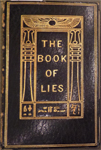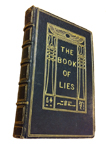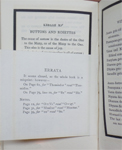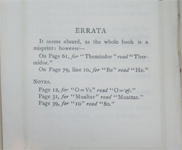100th
MP

|
THE
100th
MONKEY
PRESS |
|
|
|
Limited Editions by Aleister Crowley & Victor B. Neuburg |
|
Bibliographies |
|
Download Texts
»
Aleister
Crowley
WANTED !!NEW!!
|
|
THE BOOK OF LIES |
|
Image Thumbnails |
||||||||||||||||||||||||||||||||||||||||||||||||||||||||||||||||||||||||||||||||||||||||||||||||||||||||||||||||||||||||||||||||||||||||||||||||||||||||||||||||||||||||||||||||||||||||
|
Title: |
The Book of Lies (Liber CCCXXXIII). Which is also Falsely Called Breaks. The Wanderings or Falsifications of the One Thought of Frater Perdurabo, which Thought is itself Untrue. |
|
||||||||||||||||||||||||||||||||||||||||||||||||||||||||||||||||||||||||||||||||||||||||||||||||||||||||||||||||||||||||||||||||||||||||||||||||||||||||||||||||||||||||||||||||||||||
|
Variations: |
|
|||||||||||||||||||||||||||||||||||||||||||||||||||||||||||||||||||||||||||||||||||||||||||||||||||||||||||||||||||||||||||||||||||||||||||||||||||||||||||||||||||||||||||||||||||||||
|
Publisher: |
Weiland & Co.1 |
|||||||||||||||||||||||||||||||||||||||||||||||||||||||||||||||||||||||||||||||||||||||||||||||||||||||||||||||||||||||||||||||||||||||||||||||||||||||||||||||||||||||||||||||||||||||
|
Printer: |
|
|||||||||||||||||||||||||||||||||||||||||||||||||||||||||||||||||||||||||||||||||||||||||||||||||||||||||||||||||||||||||||||||||||||||||||||||||||||||||||||||||||||||||||||||||||||||
|
Published At: |
||||||||||||||||||||||||||||||||||||||||||||||||||||||||||||||||||||||||||||||||||||||||||||||||||||||||||||||||||||||||||||||||||||||||||||||||||||||||||||||||||||||||||||||||||||||||
|
Date: |
circa early February 1913. |
|||||||||||||||||||||||||||||||||||||||||||||||||||||||||||||||||||||||||||||||||||||||||||||||||||||||||||||||||||||||||||||||||||||||||||||||||||||||||||||||||||||||||||||||||||||||
|
Edition: |
1st Edition. |
|||||||||||||||||||||||||||||||||||||||||||||||||||||||||||||||||||||||||||||||||||||||||||||||||||||||||||||||||||||||||||||||||||||||||||||||||||||||||||||||||||||||||||||||||||||||
|
Pages: |
116 + 15 pages of advertisements + i.2 |
|||||||||||||||||||||||||||||||||||||||||||||||||||||||||||||||||||||||||||||||||||||||||||||||||||||||||||||||||||||||||||||||||||||||||||||||||||||||||||||||||||||||||||||||||||||||
|
Price: |
Priced at one guinea.5 |
|||||||||||||||||||||||||||||||||||||||||||||||||||||||||||||||||||||||||||||||||||||||||||||||||||||||||||||||||||||||||||||||||||||||||||||||||||||||||||||||||||||||||||||||||||||||
|
Remarks: |
Crowley presented one of the 10 vellum copies to Frater Achad in April 1919 with the inscription "To my beloved son Arctaeon from To Mega Therion, An XV, Sol in Aries".7 All printed pages bordered in a heavy black frame. Contains an errata slip following page 60.1 There's some controversy over whether this book was published in 1912 or 1913. The evidence predominantly points to the book being published in 1913 and not in 1912 as Crowley relates in his meeting with Theodor Reuss.4 |
|||||||||||||||||||||||||||||||||||||||||||||||||||||||||||||||||||||||||||||||||||||||||||||||||||||||||||||||||||||||||||||||||||||||||||||||||||||||||||||||||||||||||||||||||||||||
|
Pagination:2 |
|
|||||||||||||||||||||||||||||||||||||||||||||||||||||||||||||||||||||||||||||||||||||||||||||||||||||||||||||||||||||||||||||||||||||||||||||||||||||||||||||||||||||||||||||||||||||||
|
Contents: |
|
|||||||||||||||||||||||||||||||||||||||||||||||||||||||||||||||||||||||||||||||||||||||||||||||||||||||||||||||||||||||||||||||||||||||||||||||||||||||||||||||||||||||||||||||||||||||
|
Author’s Working Versions: |
|
|||||||||||||||||||||||||||||||||||||||||||||||||||||||||||||||||||||||||||||||||||||||||||||||||||||||||||||||||||||||||||||||||||||||||||||||||||||||||||||||||||||||||||||||||||||||
|
Other Known Editions: |
||||||||||||||||||||||||||||||||||||||||||||||||||||||||||||||||||||||||||||||||||||||||||||||||||||||||||||||||||||||||||||||||||||||||||||||||||||||||||||||||||||||||||||||||||||||||
|
Bibliographic Sources: |
|
|
||||||||||||||||||||||||||||||||||||||||||||||||||||||||||||||||||||||||||||||||||||||||||||||||||||||||||||||||||||||||||||||||||||||||||||||||||||||||||||||||||||||||||||||||||||||
|
Comments by Aleister Crowley: |
The spring of 1912 found me once more hovering between London and Paris. I wrote a few first-rate lyrics, a few more or less important essays, such as “Energized Enthusiasm”, but on the whole, the virtue had gone out of me as far as big conceptions and elaborate executions were concerned. The campaign of 1911 had exhausted my heavy ammunition for the time being. None the less, I could point to one solid achievement on the large scale, as I must consider it, although it is composed of more or less disconnected elements. I refer to The Book of Lies. In this there are ninety-three chapters: we count as a chapter the two pages filled respectively with a note of interrogation and a mark of exclamation. The other chapters contain sometimes a single word, more frequently from half a dozen to twenty phrases, occasionally anything up to a dozen paragraphs. The subject of each chapter is determined more or less definitely by the Cabbalistic import of its number. Thus, Chapter 25 gives a revised ritual of the Pentagram; 72 is a rondel with the refrain “Shemhamphorash”, the Divine name of 72 letters; 77 Laylah, whose name adds to that number; and 80, the number of the letter Pé, referred to Mars, a panegyric upon war. Sometimes the text is serious and straightforward, sometimes its obscure oracles demand deep knowledge of the Cabbalah for interpretation; others contain obscure allusions, play upon words, secrets expressed in cryptogram, double to triple meanings which must be combined in order to appreciate the full flavour; others again are subtly ironical or cynical. At first sight the book is a jumble of nonsense intended to insult there reader. It requires infinite study, sympathy, intuition and initiation. Given these, I do not hesitate to claim that in none other of my writings have I given so profound and comprehensive an exposition of my philosophy on every plane. I deal with the inmost impulses of the soul and through the whole course of consciousness down to the reactions of the most superficial states of mind. I consider this book so important as a compendium of the contents of my consciousness that I beg leave to illustrate the above points. “Mind is a disease of semen” asserts a theory of the relations between the conscious and subconscious, whose main thesis is that the true ego lurks silent in the quintessence of physical form, whereas the conscious self is no more than the murmur of its moods whenever its supremacy is challenged by environment. In Chapter 37, thought is compared to the darkness of a lunar and spiritual ecstasy to that of a solar eclipse. Both shadows are rare accidents in a universe of light. Again, “In the Wind of the mind arises the turbulence called I. It breaks; down shower the barren thoughts. All life is choked.” Elsewhere, deep spiritual wisdom is evoked by tea at Rumpelmayer’s, dinner at Lapérouse, breakfast at the Smoking Dog, a walk in the forest, or the dealings of the Master with his disciples. Let me further brag that even uninstructed souls have found enlightenment and ecstasy in these mysterious mutterings. One brilliant boy wrote in Poetry and Drama as follows: Creation and destruction of gods has been for centuries mankind’s favourite religious mania and philosophical exercise. The Book of Lies is a witty, instructive and wholly admirable collection of paradoxes, in themselves contradictory, summing up and illustrating various experiments in god-making. Frater Perdurabo, however, has not written a philosophical or mystical treatise; on the contrary, his book leaves one with a feeling of intense exhilaration and clearheadedness. The book cannot be judged by the mere reading of excerpts; nor can it be read straight through. Indeed, if one is really desirous to appreciate its subtleties, this should not be attempted before twelve p.m. To be carried about and discussed at leisure, to annoy, repel, stimulate, puzzle and interest, are evidently some of its functions. Stupendously idiotic and amazingly cleaver, it is at the same time the quintessence of paradox and simplicity itself; yet when all this is said one is still far from the core, for just when one thinks to have discovered it, one finds that many obvious beauties of thought and expression have been overlooked, others misinterpreted. Sometimes one is even doubtful if the author himself could translate into definite terms the exact meaning of his aphorisms and paradoxes without detracting from the value of the book as an artistic expression of his personality. This is, however, an individual appreciation. The Book of Lies will therefore be interpreted differently by each reader and judged accordingly. — The Confessions of Aleister Crowley. New York, NY. Hill and Wang, 1969. Pages 687-688. ______________________________
Much fun has been made of the alchemists for insisting that the Great Work, an ostensibly chemical process, can only be performed by adepts who fear and love God, and who practise chastity and numerous other virtues. But there is more common sense in such statements than meets the eye. A drunken debauchee cannot perform delicate manipulations in chemistry or physics; and the force with which the secret is concerned, while as material as the Becquerel emanations, is subtler than any yet known. To play great golf or great billiards, to observe delicate reactions, or to conduct recondite mathematical researches, demands more than physical superiorities. Even the theological requirements of alchemy had meaning in those days. An Elizabethan who was not “at peace with God” was likely to be agitated and thereby unfitted for work demanding freedom from emotional distraction. I have found in practice that the secret of the O.T.O. cannot be used unworthily. It is interesting in this connection to recall how it came into my possession. It had occurred to me to write a book, The Book of Lies, which is also falsely called Breaks, the wanderings or falsifications of the one thought of Frater Perdurabo which thought is itself untrue. Each of its ninety-three chapters was to expound some profound magical dogma in an epigrammatic and sometimes humorous form. The Cabbalistic value of the number of each chapter was to determine its subject. I wrote one or more daily at lunch or dinner by the aid of the god Dionysus. One of these chapters bothered me. I could not write it. I invoked Dionysus with peculiar fervour, but still without success. I went off in desperation to “change my luck”, by doing something entirely contrary to my inclinations. In the midst of my disgust, the spirit came upon me and I scribbled the chapter down by the light of a farthing dip. When I read it over, I was as discontented as before, but I stuck it into the book in a sort of anger at myself as a deliberate act of spite towards my readers. Shortly after publication, the O.H.O. came to me. (At that time I did not realize that there was anything in the O.T.O. beyond a convenient compendium of the more important truths of freemasonry.) He said that since I was acquainted with the supreme secret of the Order, I must be allowed the IX° and obligated in regard to it. I protested that I knew no such secret. He said, “But you have printed it in the plainest language.” I said that I could not have done so because I did not know it. He went to the bookshelves and, taking out a copy of The Book of Lies, pointed to a passage in the despised chapter. It instantly flashed upon me. The entire symbolism, not only of freemasonry but of many other traditions, blazed upon my spiritual vision. From that moment the O.T.O. assumed its proper importance in my mind. I understood that I held in my hands the key to the future progress of humanity. — The Confessions of Aleister Crowley. New York, NY. Hill and Wang, 1969. Pages 709-710. |
|||||||||||||||||||||||||||||||||||||||||||||||||||||||||||||||||||||||||||||||||||||||||||||||||||||||||||||||||||||||||||||||||||||||||||||||||||||||||||||||||||||||||||||||||||||||
|
Reviews: |
I am not at all sure what is the meaning (assuming there to be
one) of this fantastic book by Mr. Aleister Crowley. Some of
its chapters seem entire nonsense, but in others I can discern
something of a philosophy which is a negation of philosophy;
which regards thought as the excrement of mind, and reason as
foolishness. . . . Certainly such philosophy as this is a lie,
if that is the meaning of the title. I am not at all sure what is the meaning (assuming there to be one) of this fantastic book by Mr. Aleister Crowley. Some of its chapters (of which there are ninety-one, varying in length from one word to a page and a half) seem entire nonsense, but in others I can discern something of a philosophy which is the negation of philosophy—a philosophy (if it may be so termed) which regards thought as the excrement of mind and symptomatic of disease, and reason as foolishness, and whose ethics may be summed up in two sentences: (i) Do as you please, (ii) Strive to be annihilated, for therein only is lasting bliss to be found. Certainly such philosophy as this is a lie, if that is the meaning of the title. But, indeed, I am inclined to regard the book rather as a fantastic and elaborate joke; and I can imagine its author laughing at the thought of its readers striving to extract a profound meaning at the following: “Asana destroys the static body (Nama). Pranayama destroys the dynamic body (Rupa). Yama destroys the emotions (Vedana). Niyama destroys the passions. Dharana destroys the perceptions (Sañña). Dhyana destroys the tendencies (Sankhara). Samhadi destroys the consciousness (Viññanam). Homard à la Themindor destroys the digestion. The last of these facts is the one of which I am most certain.” But I do not think Mr. Crowley’s humour is always in the best taste, nor can I always see the point of his jokes, and at times his words and suggestions seem quite deliberately and unnecessarily blasphemous and objectionable. I regard sexual symbolism as a valid method of expression; but I like it unperverted. And certainly the joke is not on the side of the reader who, purchasing this book, finds that he has paid for it at the rate of over fourpence per leaf. There is an errata slip inserted at the page from which I have just quoted correcting the spelling of “Themindor” to “Thermidor,” which commences by informing us that “It seems absurd [to have an errata slip], as the whole of the book is a misprint: however—Shall we let the book pass as that? Perhaps the price is also a misprint! H.S. Redgrove. —The Occult Review, July 1913. ______________________________
Creation and destruction of gods has been for centuries mankind's favourite religious mania and philosophical exercise. The Book of Lies is a witty, instructive and wholly admirable collection of paradoxes in themselves contradictory, summing up and illustrating various experiments in god-making. Frater Perdurabo, however, has not written a philosophical or mystical treatise; on the contrary, his book leaves one with a feeling of intense exhilaration and clearheadedness. The book cannot be judged by the mere reading of excerpts; nor can it be read straight through. Indeed if one is really desirous to appreciate its subtleties, this should not be attempted before 12 p.m. To be carried about and discussed at leisure, to annoy, repel, stimulate, puzzle and interest, are evidently some few of its functions. Stupendously idiotic and amazingly clear, it is at the same time the quintessence of paradox and simplicity itself; yet when all this is said one is still far from the core, for just when one thinks to have discovered it, one finds that many obvious beauties of thought and expression have been overlooked, others misinterpreted. Sometimes one is even doubtful if the author himself could translate into definite terms the exact meaning of his aphorisms and paradoxes without detracting from the value of the book as artistic expression of his personality. This is, however, an individual appreciation. The Book of Lies will be interpreted differently by each reader and judged accordingly. —Poetry and Drama, June 1913. ______________________________
In the famous "Book of Lies," one of the best modern treatises on mysticism, by Frata Perdurabo, the author fills his first page with a question-mark, and the reverse of it with a mark of exclamation, signifying that the Universe has two phases, scepticism and mysticism, and that these two are equal and opposite, and therefore One. His first chapter he calls "The Chapter which is not a chapter," and begins it with the sign: O! He means, by the O, the infinitely large; by the ? the infinitely small; and, by the straight line, the manifested universe, the result of the interplay of the first two. He then descends to our inferior understanding by using mere words, and describes "The Ante Primal Triad which is NOT-GOD" in these simple but elegant terms: "Nothing is. Nothing becomes. Nothing is not." Of course, when Nothing is not, Something is; so we reach "The First Triad, which is GOD," which begins "I AM." There are many other chapters to excite wonder in this little volume. Here are some additional phrases: It is not necessary to understand; it is enough to adore. The God may be of clay; adore him and he becomes GOD. We ignore what created us; we adore what we create. Let us create nothing but GOD! That which causes us to create is our true father and mother; we create in our own image —which is theirs. Let us therefore create without fear; for we can create nothing that is not GOD. And this is from the chapter called "Phaeton": "No. Yes. Perhaps. O! Eye. I. Hi! Y! No. Hail! This chapter needs no explanation; it is evidently a perfect synopsis and solution of the great Philosophical, Mystical and Ethical Problem which has always, and will always, baffle MAN. —Vanity Fair, July 1916. ______________________________
I have read with great care two very extraordinary books for which one Frater Perdurabo is partly or wholly responsible, "The Book of Lies," and "Book Four," both published by Messrs. Wieland & Co., Avenue Studios, South Kensington. "Book Four" is sold for a shilling, but "The Book of Lies" is evidently far more precious, for though its wisdom fills only 116 small black-edged pages, it is not obtainable for less than a guinea. Allow me to reproduce its name and description in full (done). Now that, I thought, was rather pleasant, but looking on I perceived that these breaks could not be profitable to me without a severe intellectual preparation. I turned to "Book Four," and there I read: "This book is intentionally not the work of Frater Perdurabo. Experience shows that his writing is too concentrated, too abstruse, too occult for ordinary minds to apprehend." "Book Four" seems intended as a kind of introduction to the "Book of Lies." It has also other objects. It tells one, for example, how to procure certain of the very interesting works of Mr. Aleister Crowley for the insignificant sum of 6 guineas, 31 dollars, or 156 francs. It tells one, also, how to approach the throne of the Brother, how to gain a spiritual power not unlike his, although he is anxious, being "the most honest of all the great religious teachers," that nobody shall believe him. Hoping some day to be able to write little books that should sell for a guinea apiece, and also to understand "The Book of Lies," I set myself vehemently to the study of "Book Four." I experimented with "the seven keys to the great gate," though I admit my ambition led me to concentrate my energies chiefly on "Meditation," as Soror Virakem says that this, as described in "Book Four," is "The Way of Attainment of Genius or Godhead considered as a development of the Human Brain." Genius or Godhead; either would suit me well. I will not describe my experiments in detail but rather their results, which were a very bad cold in the head, and a few words of poetry which I am informed are worthy of Shakespeare and were indeed used by him in his noblest tragedy. Facing page 25 of "Book Four" is a photograph of a man naked sitting on the floor hugging his shins and hiding his face in his knees. I observed it with reverence, for it might perhaps represent Frater Perdurabo himself, whom I have not the honour of knowing by sight. Opposite the picture I read: "The Student must know set his teeth and go through with it." I set my teeth. I went through with it, and, perhaps because February is a rather wintry month, there resulted first the Shakespearean words and secondly a very bad catarrh. The words were these:—
"Poor Tom. . . Tom's a-cold."
If any should doubt the Shakespearean nature of this inspiration, my informant, who knows the works of that great master refers to the Tragedy of Lear, Act iii. Scene 4. Frater Perdurabo has not been so fortunate. Indeed, I fear that though his method lifted me to Shakespeare's level in "Genius or Godhead" it played its inventor false. Perhaps two or three or even more "ways of attainment" clashed with each other. Or—and with reverence must we contemplate this possibility—Frater Perdurabo attained too much. He put himself so vigorously in motion towards his goal that he overshot it and was carried past the common godhead or genius and hurled into something far beyond it, a region of super0divinity or super-genius so far above us that language will not bridge the gap—the gulf that divides its perfect wisdom from our feeble groping expression. Let me give an example of the poetry of Frater Perdurabo. A few of the names of his poems will no doubt sharpen our appetite, so I copy them out from the list which Frater Perdurabo calls "Pro and Con Tents": "The Sabbath of the Goat," "The HIMOG" (a note explains that this means "Holy Illuminated Man of God"), "Corn Beef Hash," "Trouble with Twins," "Skidoo," "Haggai-Howlings," "The Blind Pig" (a note explains that πγ = PG = Pig without an I = Blind Pig). Many of the other titles are no less promising. Here, however, is the chapter called "Skidoo."
"SKIDOO" "What man is at ease in his Inn?"—"Get out."—"Wide is the world and cold."—"Get out."—"Thou hast become an in-itiate."—"Get out." "But thou canst not get out by the way thou camest in. The way out is THE WAY."—"Get out."—"For OUT is Love and Wisdom and Power."—Get out."—"If thou hast T already, first get UT."—"Then get O."—"And so at last get out." There are two notes to this chapter which do not, to my mind, much elucidate it. "O," we are told, "+ VS, The Devil of the Sabbath; U = 8, the Hierophant or Redeemer; T = Strength, the Lion." "T," on the other hand, is "manhood, the sign of the cross or phallus; UT, the Holy Guardian Angel; UT, the first syllable of Udgita, see the Upanishads; O, Nothing, or Nuit." Here is something far beyond Shakespearean simplicity. Perhaps I should have attained to it if I had persisted in my naked meditation on the floor, beyond the very bad cold that brought it to an end. Let me take another example:—
"PHAETON." "No."—"Yes."—"Perhaps."—"O!"—"Eye."—"Hi!"—"Y?"—No."—"Hail! all ye spavined, gelded, hamstrung horses!"—"Ye shall surpass the planets in their courses."—"How? Not by speed, not strength, not power to stay, but by the Silence that succeeds the Neigh!" There are no notes to this chapter. "This book," another chapter tells us, "would translate Beyond-Reason into the words of Reason." The difficulty the author encountered was like that of explaining snow to the inhabitants of the Tropics. The result is quite unintelligible to a simple brother like myself, whose only effort so far has been to keep on the hither side of reason, who is also hampered by the cold in the head given him by the position pictured in "Book Four." Yet through these Haggai-Howlings, I admit, there does appear a personality, perhaps a philosophy, a doubt of a doubt of a doubt (I offer this phrase to Frater Perdurabo for his next book), a certain vehemence of passion, a sense of humour rare in philosophers, and a determination not to be too easily understood. "Adepts," we learn, "have praised silence; at least it does not mislead as speech does." Frater Perdurabo howls aloud. That, I suggest, is a mistake. Page 5 of his book is occupied only by a mark of interrogation: a mark of exclamation is alone in the middle of page 6. Perhaps we may take these pages as promises of an improved method. A more silent and so, in the view of "adepts," a less misleading guinea's worth might well be made by a development of the hitherto neglected occult meaning of spaces of blank paper, and the wonderful signs constrained usually by "the slaves of reason" to the servile punctuation of the common speech. —Frater Perditus. —The New Witness, date unknown. |
|||||||||||||||||||||||||||||||||||||||||||||||||||||||||||||||||||||||||||||||||||||||||||||||||||||||||||||||||||||||||||||||||||||||||||||||||||||||||||||||||||||||||||||||||||||||
|
|














